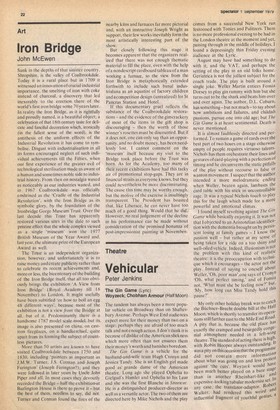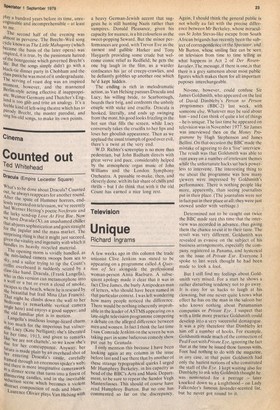Theatre
Vehicular
Peter Jenkins
The Gin Game (Lyric) WOyzeck; Chobham Armour (Half Moon).
The tandem has always been a more popular vehicle on Broadway than on Shaftesbury Avenue. Perhaps West End audiences expect more for their money than two on a stage; perhaps they are afraid of too much talk and not enough action. I don't think it is because of dislike of the American slickness which more often than not ensures them their money's worth and banishes boredom.
The Gin Game is a vehicle for the husband-and-wife team Hugh Crony') and Jessica Tandy, She is an English girl made good as grande dame of the American theatie. Long ago she played Ophelia to Gielgud's Hamlet and Ophelia to his Lear and she was the 'first Blanche in Streetcar. He is a distinguished producer-director as well as a versatile actor. The two of them are directed here by Mike Nichols and the play spectator i septernoer 19/9 comes from a successful New York run festooned with Tonies and Pulitzers. There is no more professional evening to be had in the London theatre at the moment and yet, passing through in the middle of holidays, I found a depressingly thin Friday evening audience at the Lyric.
August may have had something to do with it, and the VAT, and perhaps the setting of the play in an old folks home. Geriatrica is not the jolliest subject for the coach trade. The play is built around a single joke. Weller Martin entices Fonsia Dorsey to play gin rummy with him but she turns out to be the shark and beats him over and over again. The author, D.L. Coburn, has something— but not much —to say about how ambitions and failures, and childish passions, pursue one into old age; but The Gin Game is at heart sentimental. Death is never mentioned.
It is almost faultlessly directed and performed. To sustain a game of cards over the best part of two hours on a stage otherwise empty of people requires virtuoso talents. Nichols has them orchestrate their lines and gestures of card-playing with a perfection of timing and he circumvents the static pitfalls of the play without recourse to false or wanton movement. I suspect that the author intended a more melodramatic ending when Weller, beaten again, lambasts the card table with his stick in uncontrollable rage. It was a typical Nichols touch to play this for the laugh which made for a more powerful and emotional climax, I found myself revolting against The Gin Game while basically enjoying it. It was not that I objected to an Aristotelian identification with the dementia brought on by persistent losing at family games — I know the passion well — but rather at my sense of being taken for a ride on a too shiny and well-oiled vehicle. Indeed, illusionism is not the problem with this kind of realistic theatre: it is the preoccupation with technique which it encourages — the actor not the play. Instead of saying to oneself about Weller, 'Oh, poor man',one says of CronYu 'Oh, what perfect timing,' and of Fonsia not, 'What must she be feeling now?' hut, 'My, how long can Miss Tandy hold this pause?'
My only other holiday break was to catch the Buchner—Brecht double bill at the Half Moon, which is shortly to transfer its operations still further east to the Mile End Road. A pity that is, because the old place has exactly the cramped and besiegedly congenial atmosphere needed in a left-wing theatre. The standard of acting there is high, It with Robin Hooper always outstanding. was a pity on this occasion that the programme did not contain more information about what was going on and less protest against 'the cuts'. Wovzeck would have been much better played on a bare stage, than in another Rheinhart-like an": expensive-looking case. he ) e-Itotkitnrgantusibautolarramdta)dp) e-Itotkitnrgantusibautolarramdta)dp) modernist rnist set. ht Walker, had rendered this weZilaerird influential fragment of youthful genius. a Play a hundred years before its time, unrecognisable and incomprehensible — at least 110 me, The second half of the evening was almost as perverse. The Brecht—Weil song cycle known as The Little Mahagony (which became the basis of the later opera) was inspired, it is true, by the passionate hatred of the bourgeoisie which governed Brecht's life. But the songs simply didn't go With a black-tie dinner party in Chobham and the class pastiche was most of it undergraduate. The serving of roast dog was an inspired moment, however, and the mannered Berlin-style acting effective if inappropriate. Weimar Germany and Thatcher's England is too glib and trite an analogy. It's a feeble kind of left-wing theatre which has to Parody Brecht, the master parodist, and sing his old songs, to make its own points.































 Previous page
Previous page